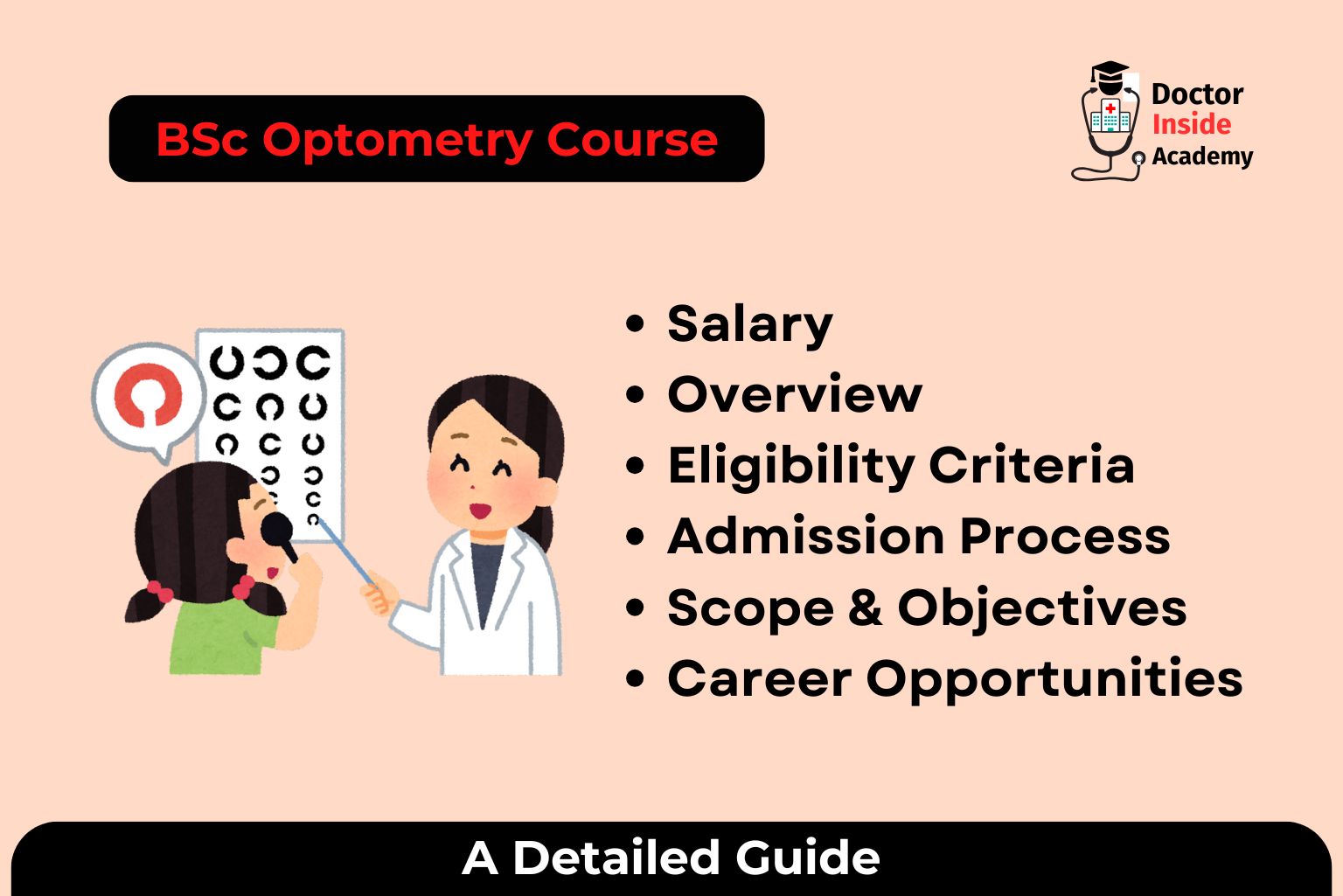
BSc Optometry Course
Duration
4 Years
Level
Under Graduation
Mode
Offline/Full Time
Overview of BSc Optometry
The Bachelor of Science in Optometry is a four-year undergraduate program with eight semesters.. Of these eight semesters, two are training-based at eye care facilities like eye care hospitals or clinics, while the other six are theory-based and performed in the classroom.
- B.Sc. Optometry program covers the analysis of life sciences, vision, optometric sciences, anatomy and physiology of infection, optics, and optical science.
- Students enrolled in a B.Sc. optometry program gain comprehensive knowledge and comprehension of orthotics and vision training, as well as how to diagnose visual issues, conduct vision screenings (eye tests).
- Provide optometric counselling to patients with colour blindness, partial sight, and hereditary vision deficiencies, and design and operate low vision aids, contact lenses, and spectacles.
Radiology is an emerging medical science field, with many career opportunities in private and government hospitals or nursing homes. This course is already occupied with theory and practical sessions effectively.
Duration of Bachelor of Science in Optometry
- The average duration of BSc Optometry is 4 years, including with 1-year mandatory internship in nearby or campus eye care clinics or hospitals.
BSc Optometry Includes
- Optometry is a field of medicine that deals with eye and vision care. Among the primary medical professionals, optometrists are responsible for refraction and dispensing, helping to identify and treat eye disorders, and managing visual system disorders.
- In the past, optometrists just fit the glasses; right now, they also examine and assist in diagnosing eye conditions. In addition to spectacles, optometrists also give low-vision treatments and correction equipment such as contact lenses.
BSc Optometry Details
Particulars | Details |
BSc Optometry Level | Undergraduation |
BSc Optometry Duration | 4 Years |
BSc Optometry Fees | Average INR 35,000-85,000(Per Semester)* |
BSc Optometry Admission Criteria | Merit or Entrance-Based |
BSc Optometry Eligibility Criteria | +2 with PCB (Physics, Chemistry, Biology) preferred |
BSc Optometry Job Profiles | Optometrists, Optical dispensers, Contact lens specialists, Vision therapists, Lecturer, etc. |
BSc Optometry Course Salary | Average Salary INR 2.2 to 8 Lakhs* |
- *Note - Its an educational data only, realtime data may be differ may be from given value here. So please verify that first.
BSc Optometry Eligibility Criteria
The eligibility criteria for a BSc Optometry vary slightly depending on the university or institution. Here is the general eligibility for Bachloer of Optometry course, commonly found across universities and colleges:
- Some colleges/universities/institutes may conduct entrance exams for BSc Optometry course admissions.
- Minimum age at the time of admission is 17 years.
- Minimum 50% marks are compulsory.
- Some colleges/universities/institutes may conduct entrance exams for BSc Optometry course admissions.
Any student who wants to get into BSc Optometry must be passionate about this course because their performance should reflect their interests.
Provision of Lateral Entry
A two-year program for ophthalmic assistants from a reputable paramedical campus with at least two years of clinical experience.
BSc Optometry Admission Process
Fill out Our Enquiry Form
Profile Evaluation by Experts
Get a Call Back from Our Counsellors
Scope & Objectives of Bachelor of Science in Optometry
As more people in India deal with vision-related concerns, especially refractory conditions like myopia, the field of optometry is growing in scope.
- To put into practice knowledge of the clinical sciences, ocular medical sciences, visual and general sciences, and the fundamentals of the healthcare system.
- To locate, assess, evaluate, and methodically use the data to provide high-quality eye and vision care.
- Should exhibit sufficient planning skills as well as the ability to prevent, identify, diagnose, and treat ocular problems.
- To uphold professional norms, duties, and requirements of the optometry practice while putting ethical ideals into practice.
- To carry out clinical studies and current research that will advance the fields of optometry and health sciences.
- Creates skilled optometrists who can provide detailed vision screenings.
- Provides specialized treatments for visual problems, educates kids on eye health, and equips them to correct refractive errors.
- Focuses on education that is outcome-driven and fosters critical thinking for a smooth transfer to the workplace.
Syllabus of Bachelor of Science in Optometry
The program’s curriculum is designed to provide a comprehensive understanding of radiology and imaging technology.
Here is an overview of the course content:
- Health Care Delivery Systems of India
- Healthcare Professionalism and Values
- Medical Terminology & Record-keeping
- Microbiology & Pathology
- General Physiology
- General Anatomy
- Ocular Biochemistry
- Communication Skills
- Geometrical Optics
- General Pharmacology
- General Biochemistry
- Clinical Education
- Ocular Physiology
- Physical Optics
- Ocular Anatomy
- Geometrical Optics
- Computer Applications
- Nutrition
- Clinical Examination of the Ocular System
- Patient Safety and Quality Assurance
- General and Ocular Microbiology
- Optometric Instruments
- Ocular Biochemistry
- Ocular Pharmacology
- Employability Skills
- Clinical Education
- Optometric Optics
- Ocular Pathology
- Geometric Optics
- Ocular Diseases
- Visual Optics
- Public Health and Community Optometry
- Research Methodology and Biostatistics
- Geriatric and Pediatric Optometry
- Occupational Optometry
- Medical Law and Ethics
- Environmental Science
- Constitution of India
- Practice Management
- Medical Psychology
- Low Visual Care
- Binocular Vision
- Systemic Diseases
- Clinical Education
- Pediatric Optometry
- Geriatric Optometry
- Dispensing Optics
- Binocular Vision
- Low Vision Aids
- Contact Lenses
- Research Project
- Internship
Career Opportunities of BSc Optometry
Graduates of the BSc Optometry program have access to a wide range of professional options. They can work in a range of environments, including the public sector, business, primary healthcare, or even academia and research.

Optical Manufacturing Industry

Healthcare Administrator

Optometry Clinic Owner

Government Hospitals

Associate Professor

Vision Therapist

Lab Assistant

Researcher

Refractionists

Private Jobs
Salary After BSc Optometry in India
Experience, location, and the type of healthcare organization are some variables that affect a BSc Optometry graduate’s salary in India.
In addition to the Bachelor of Optometry pay in India, candidates get a glance at the following job profiles:
Job Profile | Description | Average Salary* | Work Setting |
Optical Manufacturing Industry | Involved in designing, producing, and quality-checking optical lenses and frames | 2.5 – 5 LPA | Optical manufacturing units |
Healthcare Administrator | Manages operations of eye care clinics or hospitals, ensuring smooth workflow | 2.5-7.5 LPA | Hospitals, clinics |
Optometry Clinic Owner | Owns and manages private eye clinics, handling patient care & business | Varies widely (4-8 LPA + profit potential) | Private practice |
Government Hospitals | Provides eye care services in government hospitals and is often involved in public health programs | 3 – 6 LPA | Government healthcare facilities |
Associate Professor | Teaches optometry courses and conducts research at academic institutions | 6 – 12 LPA | Universities, colleges |
Vision Therapist | Helps patients improve visual skills through therapy, often in clinics or hospitals | 2.5 – 5 LPA | Hospitals, clinics |
Lab Assistant | Supports optical labs by assembling and testing lenses & optical devices | 1.8 – 4 LPA | Optical labs |
Researcher | Researches eye health, diseases, or optical technologies | 3 – 6 LPA | Research institutes, universities |
Refractionists | Perform eye refraction tests to determine prescriptions for glasses/contact lenses | 2 – 5 LPA | Clinics, hospitals |
Private Jobs | Includes sales, marketing, consultancy, or specialized optometry services in the private sector | Varies on role & experience 2 – 10 LPA | Private clinics, optical stores, and companies |
*Note – It depends on many factors; it’s an average metric shown here, for educational purposes only. Real-time statistics can vary from time to time and demand.
Get Free Counselling
FAQ Bachelor of Science in Optometry
A four-year undergraduate degree leading to a B.Sc. in optometry equips students to examine eyes, identify vision issues, and prescribe glasses or contact lenses.
The candidate must have earned at least 50% in Physics, Chemistry, Biology, and Mathematics in their 10+2 or equivalent degree, plus a Bridge Course in Remedial Biology, if appropriate.
The four-year B.Sc. program in optometry includes internships or hands-on training.
Optometrists can find employment in optical stores, hospitals, or eye clinics. Research, teaching, equipment firms, or beginning your practice are further choices.
No, the majority of B.Sc. optometry programs in India do not require NEET.





